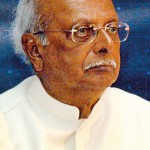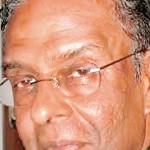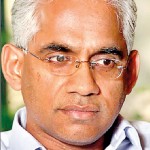News
How parliamentarians saw the Rajapaksa proposals
View(s):During the weeklong debate in Parliament, on the Second Reading of the Appropriation Bill 2015, both Government and Opposition members expressed various views on the Budget presented by President Mahinda Rajapaksa on October 24, in his capacity as Minister of Finance and Planning.
Following are excerpts of views expressed by some Parliamentarians:
Tissa Vitarana- Senior
Minister (Scientific Affairs):
This Budget is especially important for the country which is at a critical phase of development, as it moves from being a low middle-income country to an upper middle-income country. As we move forward, we have to ensure we don’t get caught in a debt trap. We must also ensure we are part of the rising Asia. We have achieved an impressive seven per cent growth rate this year.
There is no harm in resorting to taking loans, if there is a reasonable return on investments within a reasonable timeframe. Unfortunately, there is a fairly long delay in getting economic returns, as much of the State’s investments are on infrastructure such as roads and ports.
There is an urgent need for a National Industrial Policy. It should be modeled on the development policy that has been so successfully used in East Asia. A suitable task force of competent and motivated persons from among economists, planners, industrialists and others should be established to draw up such a plan.
Vijitha Herath – JVP Gampaha District MP: 
It is obvious this is an election Budget. It is a “give-give” Budget at first sight, but when you look inside, it is a Budget that has heaped a bigger tax burden on the people. Our debts will grow with this Budget. If there is a sound economic policy, then this kind of debt burden can be avoided. We are taking loans from all over the world and paying high interest, and heaping that debt burden on the people. Even the money taken on loans is being spent largely by one family. The President’s allocations keep rising, while the Budget of the Agriculture Ministry has been cut. The allocation for Parliament too has been reduced. There are many Ministers and Deputy Ministers, but the Rajapaksa family has got the bulk of the money in this Budget. Today, under this dictatorial system, Government members, even more than the Opposition, are being sidelined. Today, the wings of most Ministers have been clipped. This Budget is just a bag of promises but has no real relief for the people.
D.M. Swaminathan –
UNP National List MP:
The President, acting in the capacity of Finance Minister, introduced the Budget on October 24. This Budget contains many proposals.
Strengthening State Business enterprises, strengthening Banking and Financial institutions. Equity and Debt Market, Legal and Judiciary Reforms, Agrarian and Plantation, Fisheries, Education and Health.
For the last nine years the Government had forgotten the people of this country, and was only concentrating mostly on the developments of roads and other development projects in Hambantota, such as Airport and Harbour on borrowed capital from the Chinese government, paying excessive interest rates and burdening the people. It is customary that the Budget Speech is presented end November, but the present Budget is being presented in October, merely to satisfy the public, using this as a weapon for the impending Presidential Election scheduled to be held in early 2015. The Government has given many promises in this Budget as an election manifesto, but as usual, they will not be able to fulfil their promises, if you consider the Budgets from 2005 to 2014.
The present Budget is an election manifesto which cannot be enforced due to the lack of financial revenue that will be collected to fulfil the provisions of this Budget.
Eran Wickramaratne –
UNP National List MP:
This Budget has promises, but the Government has no money to fulfil them. The Government is using this Budget as an election manifesto. Allocations to vital sectors such as Agriculture have been declining since 2012, while allocations to the field of Education too are inadequate. Education is a very important field. Today, in this country, only around Rs 1,000 is expended per schoolchild per month. How can a child be given a well-rounded education for Rs 1,000? The total amount allocated for Higher Education is Rs 41 billion, whereas the loss suffered by SriLankan Airlines stands at Rs 30 billion. We have to talk about these things. When the Management of SriLankan Airlines came before COPE (Committee On Public Enterprises), I asked if there is a possibility of the airline becoming a profit-making venture. I was told this can happen by 2017. That is like the Budget presented by our Finance Minister. He says, “Do not be afraid. We will get there in the future.”
John Seneviratne- Minister of Public
Administration and Home Affairs:
This Budget will take the country towards its goal of becoming a Middle-Income Country by 2020. The UNP and other Opposition parties have said, even before it was presented, that the Government is planning to present a Budget with an election in mind. This Budget has been made to address the needs of the common man. The allegation that this has been prepared by those seated in air-conditioned rooms, to suit only the needs of the rich, is a baseless charge. Some Opposition MPs said they would present a counter Budget. Is that not a politically motivated move? We cannot forget how the UNP dealt with public servants who asked for a monthly pay rise of Rs 300 in the 1980s. The UNP has, in the past, acted in a manner that was detrimental to the interests of the public servants. People fear that, if the UNP comes to power again, it will once again hit the public servants. We have given substantial pay hikes to public servants since 2005, and also to pensioners. Most of the pension anomalies have been settled.
R. Sampanthan- TNA Trincomalee District MP:
In my view, the Budget seeks to ensure that the President presents many more Budgets. The Budget seeks to please and placate wide segments of  society, in an effort to ensure their political support for him at an election to be held very soon. It must not be denied that there are benefits that accrue to the people in the matter of development, in the matter of relief, in the matter of employment and other facilities. But, the overriding trend and theme of the Budget, quite clearly, is focused on the forthcoming election. One does not get the impression that these proposals have been prepared after careful study and introspection by various Ministries in charge of different subjects. If that was done, one would have seen a more cohesive, coordinated development programme, which could have benefited generally, the vast majority of the people. What one sees instead, are favours and handouts by the Head of State who also happens to be the Minister of Finance, to various segments and sections of society, to induce them to extend their support to him, to continue to be the Head of State at the forthcoming election.
society, in an effort to ensure their political support for him at an election to be held very soon. It must not be denied that there are benefits that accrue to the people in the matter of development, in the matter of relief, in the matter of employment and other facilities. But, the overriding trend and theme of the Budget, quite clearly, is focused on the forthcoming election. One does not get the impression that these proposals have been prepared after careful study and introspection by various Ministries in charge of different subjects. If that was done, one would have seen a more cohesive, coordinated development programme, which could have benefited generally, the vast majority of the people. What one sees instead, are favours and handouts by the Head of State who also happens to be the Minister of Finance, to various segments and sections of society, to induce them to extend their support to him, to continue to be the Head of State at the forthcoming election.
The North and East were devastated and destroyed by a vicious war. From the point of view of infrastructure, due to the efforts of various countries, with regard to the North, particularly India and other countries and other organisations, very much has been done, but very much more needs to be done. The biggest problem faced by our people is their inability to get back to their lands, which are yet occupied, or newly taken over by the armed forces or others. Both in the North and the East, housing and livelihood are the main problems. They need to be addressed early. The people in the North-East directly affected by the war are yet to be put on their feet. The Government’s insensitivity, caused either by the lack of political will or its narrow political agenda, is disappointing. The Government should realise that there is responsibility on the part of the Government, not merely to evolve an acceptable political solution, but also to take steps to ensure that the North-East is rebuilt and reconstructed, and that the people who occupied the North-East are able to live in that area as equal citizens.
During his speech, the President has also referred to political issues. We have worked with the Government to arrive at a solution to our problems. We are prepared to do that. But the Government is playing foul; the Government is not being genuine. I am not confronting the Government. I respect many people in the Government. I respect President Rajapaksa. I am prepared to talk to him and resolve this question. I am not a stooge of the Government. I am also not a person who will confront the Government. I am a person who would like to work with the Government. My Party would like to work with the Government. We are prepared to negotiate an honourable solution, a reasonable solution, an acceptable solution, a durable solution that will be acceptable to all the people in this country.

